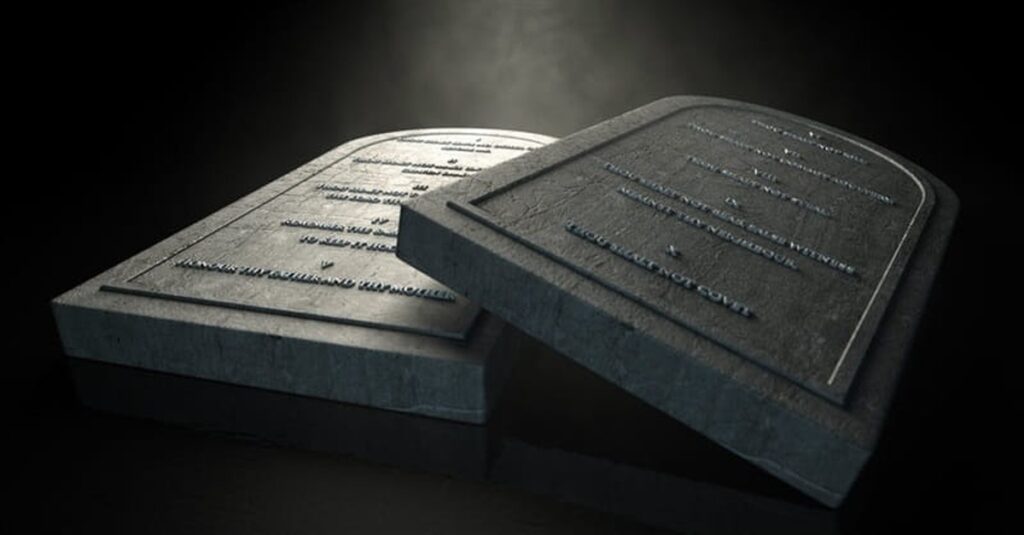This post has been written from a place of love. There is no judgement or condemnation on anyone who walks in faith differently than our family. Scripture tells us “we should be like the bereans who tested scripture” and “that we should test everything and hold tight to what is good.“ I pray you find blessings in this post and that it causes to you study scripture more.
This is a question we’ve been asked frequently over the past several years. Many people don’t fully understand or often make the assumption that we are Jewish or trying to adopt Jewish practices, which is not the case at all. We deeply respect and love the Jewish people and their culture. After all, our Messiah, Yeshua (Jesus), came from their lineage, and the Scriptures we read were written by Jewish individuals as well. So, let’s talk about it depth why we keep the Saturday Sabbath.
The Biblical Foundation: A Day Set Apart
The Sabbath originates in the creation narrative of Genesis 2:2-3, where we learn that after God created the world in six days, He rested on the seventh day:
“On the seventh day God was finished with his work which he had made, so he rested on the seventh day from all his work which he had made. God blessed the seventh day and separated it as holy; because on that day God rested from all his work which he had created, so that it itself could produce.” (Genesis 2:2-3)
This seventh day was not just an ordinary day; it was specifically set apart as holy and sanctified by God. The word “sanctified” in Hebrew is qāḏaš (Strong’s H6942), meaning to consecrate or make holy. It shows that God did not simply rest on the seventh day for His own sake but established this day as a time for humanity to observe and honor His divine rhythm of work and rest.
The idea of the Sabbath as a divine command is reiterated throughout the Torah, particularly in the Fourth Commandment, which is found in Exodus 20:8-11:
“Remember the day, Shabbat, to set it apart for God. You have six days to labor and do all your work, but the seventh day is a Shabbat for Adonai your God. On it, you are not to do any kind of work…“ (Exodus 20:8-10)
The command to keep the seventh day as a Sabbath is not a suggestion but a divine decree. God’s call to observe the Sabbath is a way for His people to honor Him and acknowledge His sovereignty over all creation. It is a day of rest, worship, and spiritual reflection.
Didn’t Jesus Changed the Sabbath to Sunday?
The word “Sabbath” is derived from the Hebrew word šāḇaṯ (Strong’s H7673), meaning “to cease” or “to rest.” It refers to a cessation from regular work, a time to stop and focus on God. The seventh day, or Saturday, is the day God rested, and it is the day He calls His people to honor and observe as the Sabbath.
Throughout the Bible, the Sabbath is consistently described as occurring on the seventh day. In fact, the biblical calendar is structured around a seven-day week, with the seventh day designated as the Sabbath. Nowhere in Scripture is there any indication that this day has been changed or altered in its observance. This consistent pattern is seen in both the Old and New Testaments.
Some might argue that the day of the Sabbath was changed from Saturday to Sunday in later Christian history, but this is a misunderstanding of biblical instruction. The shift to Sunday worship was a historical development that took place after the resurrection of Yeshua Hamashiach (Jesus Christ), largely due to early Christians commemorating Christ’s resurrection on the first day of the week. However, this change in worship day did not negate or replace the biblical Sabbath.
Claiming or stirring up arguments about our faith by claiming, “Yeshua (Jesus) changed the Sabbath day to Sunday when He stated that He is Lord of the Sabbath.” This statement comes from Mark 2:28, where Yeshua (Jesus) says, “The Son of Man is Lord even of the Sabbath.” While this is an important declaration, it’s crucial to understand the context in which He made it. Yes, Yeshua (Jesus) is indeed the Lord of the Sabbath, but that doesn’t imply He changed the day of observance from Saturday to Sunday.
When we carefully study Scripture, we find that this idea doesn’t align with the biblical narrative. In John 7:14-18, Yeshua (Jesus) explains His teaching:
“My teaching is not my own. It comes from the one who sent me. If anyone desires to do His will, he will know whether my teaching is from God or whether I speak on my own. He who speaks on his own seeks his own glory; but he who seeks the glory of the One who sent him is true, and no unrighteousness is in him.” (John 7:16-18)
What Yeshua (Jesus) is saying here is that everything He taught was not from Himself, but from the Father, the Creator of all. If Yeshua (Jesus) had changed the Sabbath day, He would have been altering God’s own law. In Deuteronomy 12:32, God commands, “Whatever I command you, be careful to observe it; you shall not add to it nor take away from it.” This is a clear directive from God to preserve His commandments as He gave them. If Yeshua (Jesus) were to change the Sabbath day, it would contradict God’s Word, something He could never do, as He perfectly upheld the law (Matthew 5:17-18).
Furthermore, looking at the historical context, we see no evidence in Scripture that Yeshua (Jesus) ever changed the Sabbath. From Genesis onward, God sanctified the seventh day, making it holy. Yeshua (Jesus) Himself, as the perfect reflection of the Father’s will, would never have acted contrary to that original command. Instead, He came to fulfill the law and bring understanding to its deeper meaning (Matthew 5:17-19). Fulfill here is γίνομαι (Strong’s G1096). It means be brought (to pass), follow, be found, be fulfilled and fully preach. What it doesn’t mean is to abolish or do away with. That word is καταλύω (Strong’s G2647) which means to dissolve, disunite, to demolish. He didn’t do away with the sabbath day, but showed us how to walk it out biblically.
While some argue that the Sabbath was changed from Saturday to Sunday by Yeshua (Jesus), Daniel 7:25 offers an important prophecy. It speaks of a power that would attempt to “change times and laws” during a later period in history. Daniel 7:25 says:
“He shall speak pompous words against the Most High, shall persecute the saints of the Most High, and shall intend to change times and law…” (Daniel 7:25)
This passage suggests a future attempt to alter divine ordinances, including the observance of the Sabbath. Historically, many scholars believe that this change took place gradually, starting with the Roman Emperor Constantine’s decree in the fourth century, which officially established Sunday as the day of worship for Christians. However, the shift was not instantaneous but occurred over time through a variety of cultural, theological, and political influences. Constantine’s edict in 321 AD, which mandated Sunday as a day of rest, is often seen as a key turning point in this transition.
However, as someone who values historical documents and physical evidence, I prefer to study the historical records surrounding these changes more closely. It is clear from early Christian writings and historical documents that the observance of Sunday as the primary day of worship did not happen overnight, but was a gradual shift over several centuries.
In conclusion, Yeshua (Jesus)’s statement in Mark 2:28 does not imply that the Sabbath was changed to Sunday. Rather, it underscores His authority as the Lord of the Sabbath, who came to teach and fulfill the law. While the Sabbath has been changed in practice over time—through external forces like Constantine’s edict—the biblical and historical record consistently points to the Sabbath being the seventh day of the week, from creation to the time of Yeshua (Jesus), and onward into the Millennial Kingdom. As believers in Messiah Yeshua (Jesus), we are called to honor the Sabbath as it was originally set apart by God. It is not a matter of legalism, but a gift of rest, a sign of our covenant with the Creator, and a practice that connects us to His divine order.
The shift from Saturday to Sunday is not mandated by Scripture. While Christians are encouraged to worship on Sunday, the New Testament does not indicate that the Sabbath command, given in the Ten Commandments, was moved to another day. In fact, Yeshua (Jesus) Himself never spoke about changing the day of the Sabbath; instead, He emphasized its proper observance (Matthew 5:17-19). The apostle Paul also continued to observe the Sabbath as a day of rest and worship throughout his ministry (Acts 13:14, Acts 16:13).
The Sabbath: More Than Just a Day of Rest
The Sabbath is not just about physical rest; it is a spiritual discipline designed to draw believers closer to God. Keeping the biblical Saturday Sabbath is about honoring God’s command and following His example of rest. It is a time to disconnect from the busyness of life, slow down, and spend time in worship, prayer, and reflection.
Observing the Sabbath offers several key benefits:
Physical Rest: The Sabbath provides an opportunity for physical renewal. In today’s fast-paced world, we often push ourselves beyond our limits, but the Sabbath offers a chance to recharge and refresh our bodies.
Spiritual Replenishment: By setting aside this day to honor God, we focus our hearts and minds on Him. The Sabbath is a day of worship, allowing us to reflect on His goodness, meditate on His Word, and deepen our relationship with Him.
Community and Family: The Sabbath is also a time to gather with loved ones and the faith community. Whether it’s attending church services, sharing meals, or simply spending time together, the Sabbath creates space for fellowship and strengthens bonds with others.
Acknowledging God’s Sovereignty: By observing the Sabbath, we acknowledge that God is the Creator and Sustainer of all things. The Sabbath serves as a weekly reminder that He is in control of our lives, and we trust in His provision.
The Unchanging Nature of the Seventh Day
Despite the many changes and cultural shifts throughout history, the seventh day Sabbath has remained unchanged. The Bible consistently teaches that the Sabbath is a day of rest that begins at sundown on Friday evening and ends at sundown on Saturday evening. This is the pattern established in Scripture and has never been altered.
It’s important to understand that the Sabbath is a covenantal sign between God and His people. In Exodus 31:16-17, God declares:
“The people of Isra’el are to keep the Shabbat, to observe Shabbat through all their generations as a perpetual covenant. 17 It is a sign between me and the people of Isra’el forever; for in six days Adonai made heaven and earth, but on the seventh day he stopped working and rested.” (Exodus 31:16-17)
The Sabbath is not merely a ritual or tradition; it is a sign of the relationship between God and His people. Just as the covenant with Israel was meant to endure forever, the Sabbath remains a perpetual sign of God’s creative and redemptive work.

The Ten Commandments and the Ark of the Covenant
One of the most significant aspects of the Sabbath commandment is its placement within the Ten Commandments, which were given directly by God to the Israelites at Mount Sinai. The Ten Commandments represent God’s moral law and serve as the foundational ethical code for humanity. These commandments were inscribed on two stone tablets, and the Bible tells us that they were placed inside the Ark of the Covenant, under the mercy seat, as a symbol of God’s covenant with His people.
In Exodus 25:16, God instructs Moses:
“And you shall put into the ark the testimony which I will give you.” (Exodus 25:16)
This “testimony” refers to the stone tablets containing the Ten Commandments, including the command to observe the Sabbath. The Ark of the Covenant, which represented God’s presence among His people, contained not just any law, but the most sacred and foundational of His commands. The placement of the Ten Commandments under the mercy seat — the place where God’s presence dwelt — is deeply significant.
The mercy seat, where the blood of the sacrifice was sprinkled once a year on the Day of Atonement, symbolized the atoning work of God and His mercy towards His people. The law, including the commandment to keep the Sabbath holy, was placed directly under this mercy seat, showing that even as we are called to obey God’s commandments, it is only through His mercy that we can truly be in right relationship with Him. The Sabbath commandment, in this sense, is inseparable from God’s grace, as it points us to His finished work of creation and redemption.

What It Means Biblically: The Sabbath and the Ark
The fact that the Sabbath commandment was placed inside the Ark (Exodus 40:17-21), while the other commandments were similarly housed (Deuteronomy 31:24-25), is not coincidental. The Sabbath is considered one of the most significant of all the commandments. By placing it under the mercy seat, God affirms the centrality of the Sabbath in the life of His people and its deep connection to His work of redemption.
The other commandments — those governing moral behavior and interactions with others — were placed on the outside of the Ark, but the Sabbath, as a command that both honors God’s creation and points to His covenant, was placed inside, directly under the mercy seat. This is a powerful message: The Sabbath is not merely a legal obligation; it is an act of worship, a sign of grace, and an eternal covenant that rests under God’s mercy.
Gentiles and the Sabbath: Part of God’s Covenant People
One of the most powerful aspects of God’s eternal plan is His inclusion of all people—Jews and Gentiles—into His covenant through faith in His Son, Yeshua (Jesus). In Romans 11, Paul makes it clear that Gentiles are grafted into the promises and blessings that were originally given to Israel. This radical inclusion is not a new concept but has always been part of God’s plan for humanity.
In Romans 11:17, Paul writes:
“But if some of the branches were broken off, and you, being a wild olive tree, were grafted in among them and became partaker of the root and fatness of the olive tree, do not boast against the branches. But if you do boast, remember that you do not support the root, but the root supports you.” (Romans 11:17)
Through this imagery of the olive tree, Paul explains that Gentiles, who were once considered outside the covenant, are now included and share in the promises of God. The “root” refers to God’s covenant with Israel, and Gentiles, through faith in Yeshua (Jesus), are grafted into that covenant. This means that the Sabbath, as part of God’s covenantal laws and blessings, is not a command only for Jews but for ALL believers, regardless of ethnic background. (Be careful you don’t fall prey to “Replacement Theology“)
The Sabbath has always been a sign of God’s covenant with His people. While it was initially given to the descendants of Abraham, the inclusion of Gentiles into the covenant through Messiah Yeshua (Jesus Christ) means that the Sabbath is just as much for them as it is for Jewish believers. Ezekiel 20:12 makes this clear:
“I gave them my shabbats as a sign between me and them, so that they would know that I, Adonai, am the one who makes them holy.” (Ezekiel 20:12)
The Sabbath is a sign—a tangible, weekly reminder of God’s sanctifying work. Through the sacrifice and resurrection of Yeshua (Jesus), Gentiles who have been grafted into the covenant are now partakers of this sign and are called to observe it, not as a legalistic command but as a means of drawing near to God and resting in His grace.
The New Testament reinforces this idea in several places, especially in Colossians 2:16-17, where Paul says:
“So don’t let anyone pass judgment on you in connection with eating and drinking, or in regard to a Jewish festival or Rosh-Hodesh or Shabbat. These are a shadow of things that are coming, but the body is of the Messiah.” (Colossians 2:16-17)
While Paul is pointing to the fact that Christ is the fulfillment of the shadow of the law, this does not invalidate the practice of the Sabbath for believers. Rather, it highlights that the true meaning of the Sabbath is found in Christ, who is the ultimate rest for the soul (Matthew 11:28). Therefore, the Sabbath serves as a day for all believers, both Jew and Gentile, to rest in Yeshua (Jesus), who provides rest and peace that transcends all understanding.
The Sabbath in the Millennial Reign of Christ
The significance of the Sabbath does not end with this life. In fact, the Bible speaks of the Sabbath being celebrated in the Millennial Reign of Christ, which is the future 1,000-year period when Jesus will rule the earth in peace and righteousness.
In Isaiah 66:23, we see a prophecy that points to the observance of the Sabbath during the Millennial Kingdom:
“Every month on Rosh-Hodesh and every week on Shabbat, everyone living will come
to worship in my presence,” says Adonai. (Isaiah 66:23)
This verse highlights that the Sabbath will still be honored during the Millennial reign of Messiah (Christ). All nations and people will be called to observe the Sabbath and worship the Lord. The Sabbath, in this prophetic vision, will remain a central aspect of God’s divine order, signifying that even in the future Kingdom, rest and worship remain vital components of our relationship with God. The prophet Ezekiel also alludes to the future restoration of Israel and the importance of the Sabbath in the Messianic Age. In Ezekiel 44:24, the priests are instructed to:
“They are to be judges in controversies, and they are to render decisions in keeping with my rulings. At all my designated festivals they are to keep my laws and regulations, and they are to keep my shabbats holy.” (Ezekiel 44:24)
The observance of the Sabbath is presented as part of the righteous order that will be established under the rule of the Messiah. It is not something that is abolished, but rather fulfilled and restored in its rightful place during Messiah (Christ)’s reign on earth.
Embracing the Gift of the Sabbath
Keeping the biblical Saturday Sabbath is not merely about following an ancient tradition or observing a set of rules. It is about honoring God’s design for life and entering into a rhythm of rest, worship, and spiritual renewal. The seventh-day Sabbath is a gift from God—one that continues to offer blessings to those who embrace it.
As we observe the Sabbath, we join with generations of believers who have faithfully kept this holy day and found joy in resting in God’s presence. It is a day to remember, to reflect, and to renew our hearts in the love and goodness of our Creator. The biblical Saturday Sabbath, unchanged from the time of creation, offers an opportunity to slow down, reconnect with God, and experience His peace in a world that often rushes by too quickly.
Through Messiah Yeshua (Jesus), Gentiles are grafted into God’s covenant with Israel and invited to observe the Sabbath as part of their faith in Him. The Sabbath is not just for Jews; it is a day of rest for all believers, a day to cease from our works and rest in the finished work of Christ. As we honor the Sabbath today, we also look ahead to the glorious day when all nations will come together in the Millennial Kingdom to worship the Lord, keeping the Sabbath as a sign of His everlasting covenant.
More Biblical Teachings
“I am Adonai your God; live by my laws, observe my rulings, and obey them, and keep my shabbats holy; and they will be a sign between me and you, so that you will know that I am Adonai your God.”
– Ezekiel 20:19-20


Leave a Reply